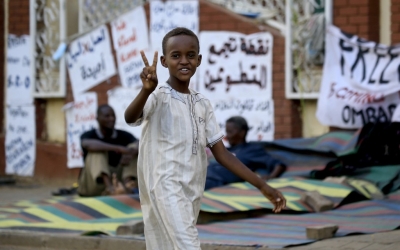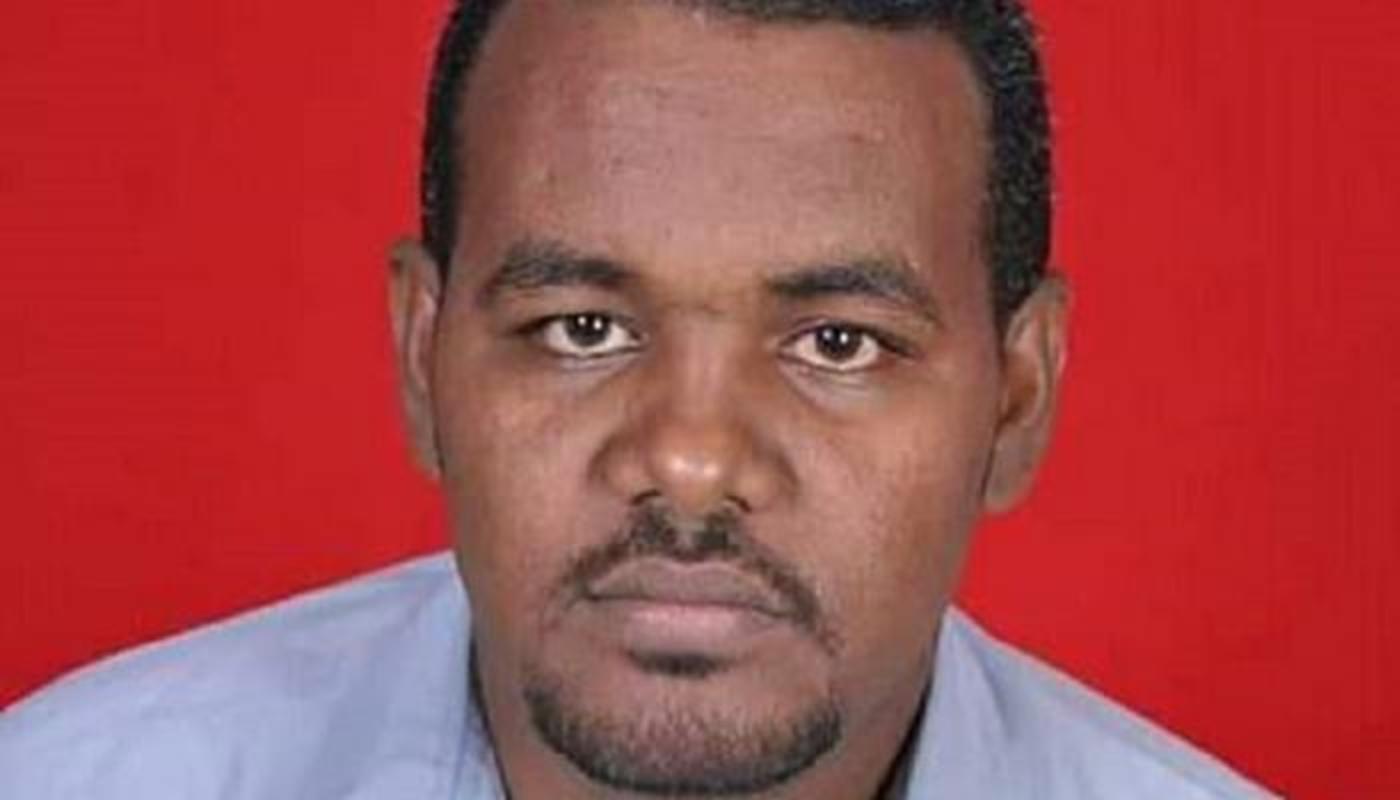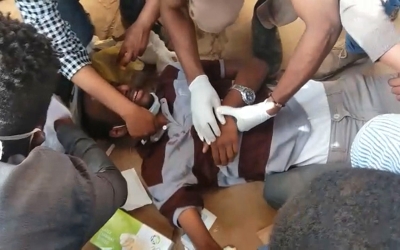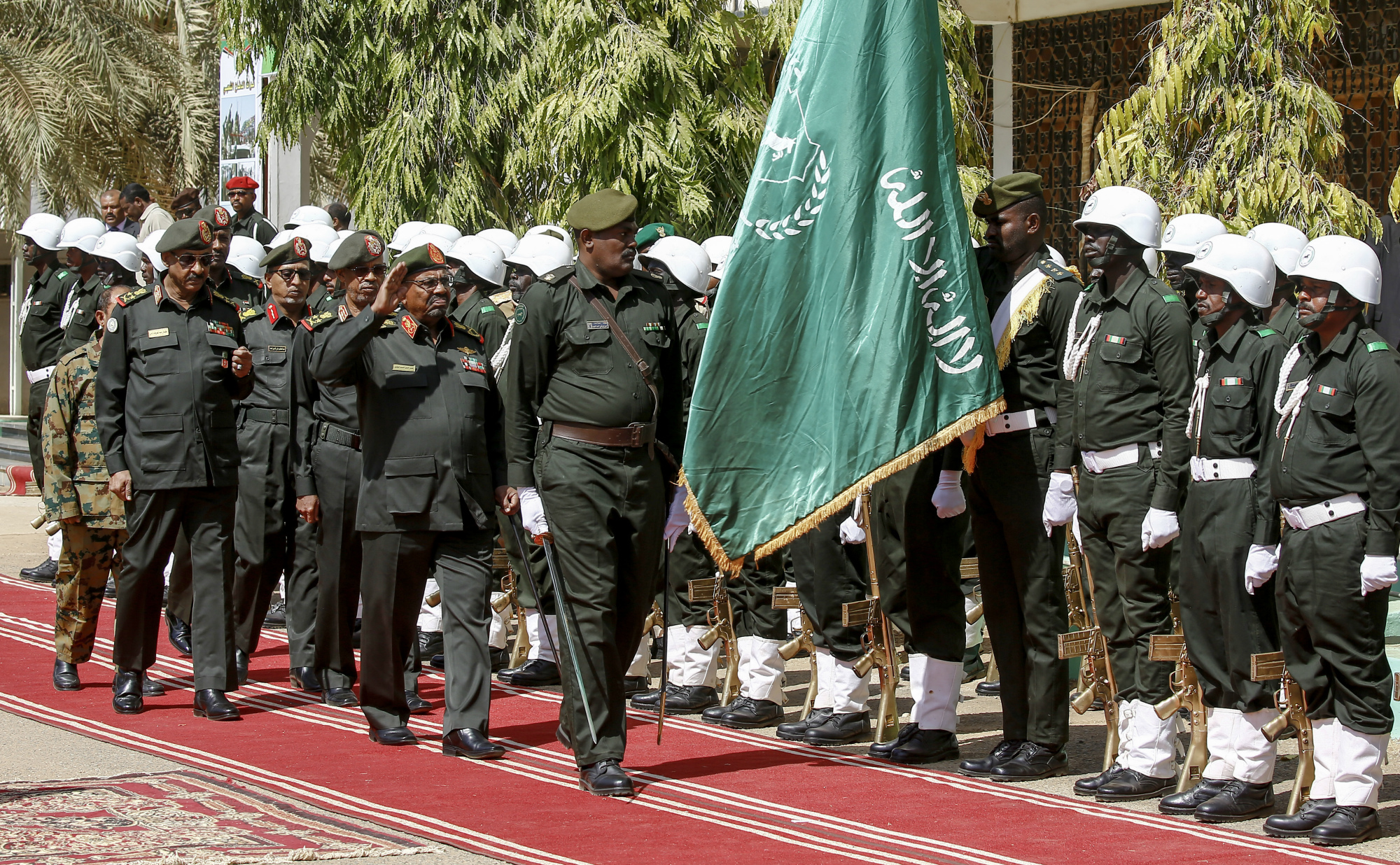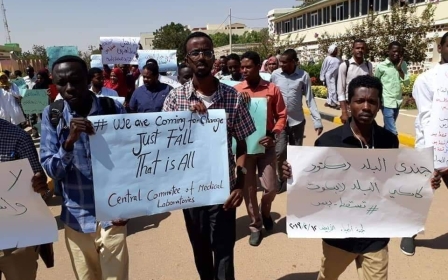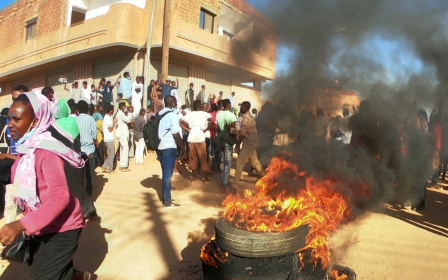Sudanese teacher was 'raped and killed by special torture unit'
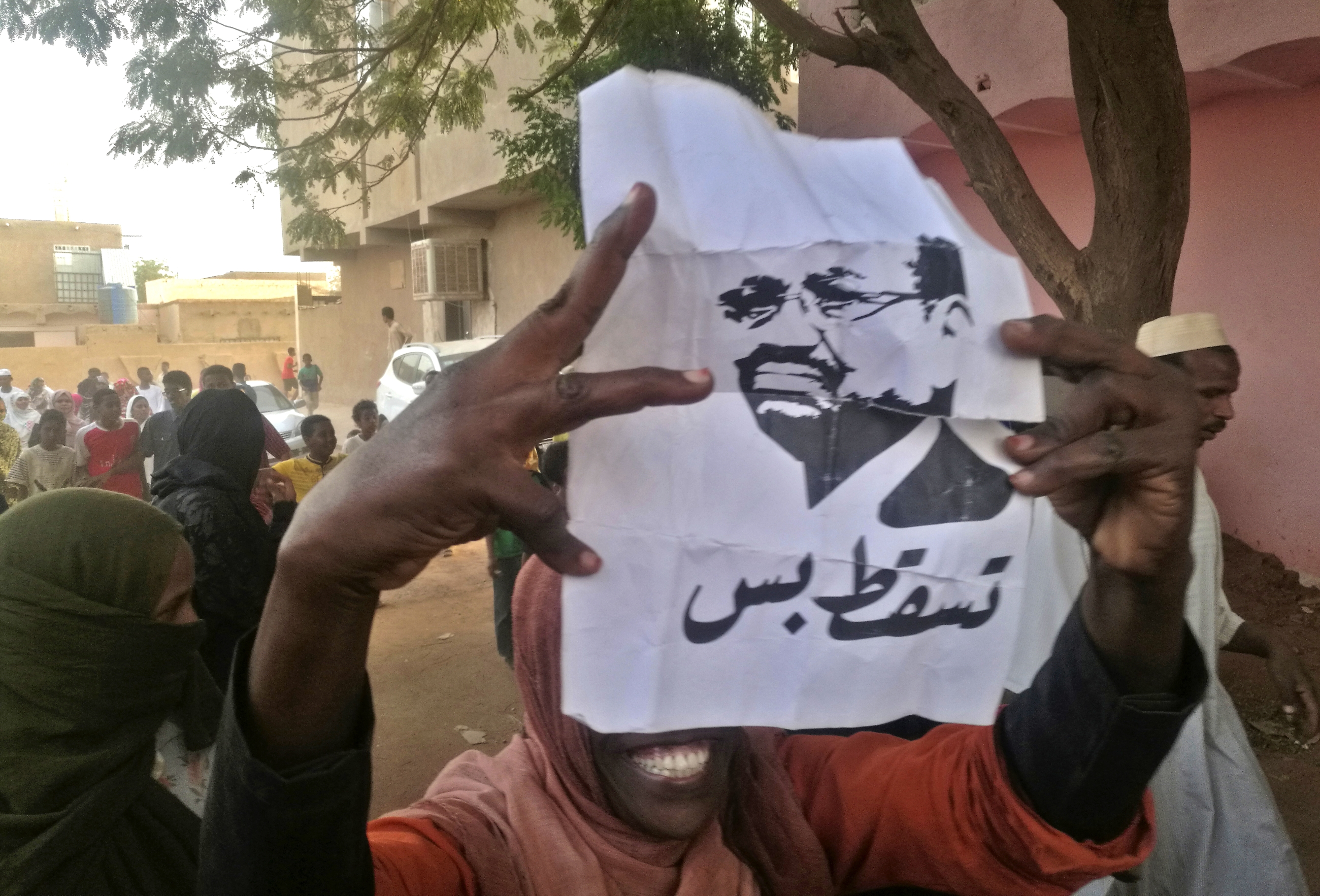
Editor's note: This story contains graphic descriptions of violence and torture. Some names have been changed to protect the identities of those concerned.
It was the moment when security personnel told detained teacher Ahmed al-Kheir to remove his trousers that Haytham Omer, another prisoner, describes as the worst of his life.
“When I heard the order to Ahmed to take off his trousers I knew they were going to rape him,” Omer told Middle East Eye.
“One of them put a solid object into his anus. By then we had already been tortured for many hours and Ahmed was close to fainting.
New MEE newsletter: Jerusalem Dispatch
Sign up to get the latest insights and analysis on Israel-Palestine, alongside Turkey Unpacked and other MEE newsletters
“Afterwards I saw blood on Ahmed’s trousers. They did the same thing to another prisoner but it wasn’t as bad for him because he resisted them more strongly.”
Kheir, who was 40 rather than 36 as previously reported according to friends spoken to by MEE, was arrested by Sudan’s National Intelligence and Security Service (NISS) along with several others taking part in anti-government protests in Khashm el-Girba in eastern Sudan’s Kassala state on 31 January.
Why are Sudanese protesting against their government?
+ Show - HideSudanese protests have evolved in the space of less than six months from complaints about bread prices to calls for long-term leader Omar al-Bashir to go and demands for a civilian-led transition to democracy.
Here's a summary of the key moments so far since the protests began.
19 December 2018: People take to the streets in the city of Atbara to protest against a government decision to triple the price of bread, torching a local ruling party office. By the next day protesters on the streets of Khartoum and other cities calling for "freedom, peace, justice". Police try to disperse the crowds, resulting in at least eight deaths. Dozens more will be killed in the weeks of protest that follow
22 February 2019: Sudanese President Omar al-Bashir declares a nationwide state of emergency. He swears in a new prime minister two days later, as riot police confront hundreds of protesters calling for him to resign
6 April: Thousands gather outside the army's headquarters in Khartoum, chanting "one army, one people" in a plea for the military's support. They defy attempts by state security forces to dislodge them and troops intervene to protect them
11 April: Military authorities announce they have removed Bashir and that a transitional military council will govern for two years. Despite celebrations at Bashir's demise, protest leaders denounce the move as a "coup" and the protesters remain camped outside army headquarters.
14 April: Protest leaders call on the military council to transfer power to a civilian government
20 April: Sudan's military rulers hold a first round of talks with protest leaders
27 April: The two sides agree to establish a joint civilian-military ruling council, but talks stall over differences in the composition of the council, with both sides demanding a a majority
15 May: With negotiators reported to be close to agreeing a three-year transition to civilian rule, military leaders suspend talks and insist protesters remove barricades outside the army's headquarters. Talks resume on 19 May but break down again on 20 May, with the opposition insistent that a civilian must head the transitional governing body
28 May: Thousands of workers begin a two-day strike to pressure the military rulers and call for civilian government
3 June: At least 35 people killed and hundreds injured, according to opposition-aligned doctors, as security forces firing live ammunition move to disperse the protest camp outside army headquarters
4 June: General Abdel Fattah al-Burhan, the head of the military council, announces that all previous agreements with protest leaders are scrapped and says elections will be held in nine months
News of his death in custody on 1 February, and reports that he had died while being tortured and interrogated, sparked further protests in towns and cities last week.
Kheir is one of at least 31 people killed since the current wave of protests began two months ago, according to government figures. Human rights organisations and opposition groups say that the death toll exceeds 50 people.
Prosecutors investigating death
But his is so far the only death that has been investigated by Sudanese prosecutors following a medical investigation which concluded that he had died as a consequence of injuries sustained in custody.
Amer Ibrahim, the head of a committee within the prosecutor's office investigating protest-related violence, told a press conference last week that prosecutors had summoned for questioning the entire unit which had been responsible for Kheir in custody.
In earlier statements, the police and security forces said that Kheir had died of food poisoning.
“The medical examination proved that Ahmed al-Kheir’s death was because of many wounds and bruises on his back, neck, head, kidneys and other parts of his body,” said Ibrahim.
“Ahmed died due to injuries caused by a solid or flexible object.”
But the prosecutor denied reports that Kheir had been raped, telling reporters that the medical examination of his body did not corroborate this allegation.
A legal expert told MEE, however, that there are doubts whether the prosecutor’s office has the authority to properly investigate and prosecute members of the security forces suspected of committing crimes against protesters.
He said the main challenge for prosecutors would be lifting the impunity under emergency laws enjoyed by members of the security forces which prevents them from being put on trial in an open court.
“I don’t think we will see a public trial, or a lifting of their impunity as is supposed to happen in such a case,” said the expert, speaking on condition of anonymity because of security concerns.
“I believe they will use the security law to send the case to a military court.”
Special security unit
Activists told MEE that Kheir and others were rounded up on Thursday 31 January after protests erupted in Khashm el-Girba.
Although Kheir was a supporter of the government-aligned Popular Congress Party, he was accused of being a local organiser of the protesters.
Omer, who was arrested alongside Kheir and four others, confirmed that the detainees had been tortured from the evening of Thursday 31 January into the early hours of Friday 1 February. The six men were beaten with sticks, burnt with cigarettes and subjected to electric shocks with stun batons.
Early on Friday, a special security unit arrived from Kassala city, the state capital, he said. It was this unit which was responsible for raping Kheir and the other prisoner, according to Omer.
“They started to torture all of us aggressively. I was lying close to Ahmed and I heard them threaten to rape him. I saw one of them bring over a solid object and they told me threateningly not to look at them.
“A few minutes later I saw the blood on Ahmed’s back."
Kheir died while they were being transferred from Khashm el-Girba to Kassala city, he said.
"They brought vehicles to take us to Kassala to complete the investigation and Ahmed died before we got there.”
Omer said that he and the others in detention had been released as soon as their guards realised that Kheir was dead.
Deaths in custody
Human rights organisations and activists say that Kheir is not the only person to die in the security forces’ custody since the protests began in December.
The African Centre for Justice and Peace Studies (ACJPS), a New York-based organisation which monitors human rights violations in Sudan, accuses the NISS and police of carrying out a violent crackdown in which emergency laws have been used to arrest, beat and threaten protesters.
It has also reported a number of cases of suspicious death in custody.
“On 20 December 2018, the NISS of Al Gedarif arrested and detained Mr Mujahid Abdalla. On 31 December, his family went to the military hospital in Al Gedarif where they received the body,” ACJPS said in a statement on 9 January.
In another case, the body of an arts student at the University of Khartoum was recovered on 31 December from the river Nile in the Sudanese capital. Abdul Rahman Alsadiq Mohamed Alamin had been missing since 25 December, the ACJPS reported.
“It appeared that he had drowned. His family refused to receive his body until an autopsy was done. It is reported that his body showed clear signs of having been tortured or subjected to ill-treatment.”
Last week, the Darfur Bar Association (DBA), an independent advocacy group, also said that two people had died after being tortured in custody by NISS officers in El Abbasiya in South Kordofan province.
“Fayez Abdallah and Hasan Talga of South Kordofan were reportedly tortured to death after being held in detention centres in the region,” the DBA said in a statement.
“NISS officers ordered them to be buried without the knowledge of their relatives.”
Shawgi Yaqoob, a member of the DBA, told MEE that Fayez Abdallah was a retired soldier from South Darfur who had been working in the gold mines in El Abbasiya.
“Fayez died on the second day of his detention,” Yaqoob said. There has been no further information released about the circumstances of Talga’s detention and death, he added.
Rape and torture 'systematic'
Several human rights activists told MEE that the rape and torture of detainees had been carried out systematically by Sudan’s security forces over the decades since President Omar al-Bashir seized power in a military coup in 1989.
Conditions of dictatorship also meant that security forces had long been able to use violence with impunity, said Mohamed Badawi, a veteran activist.
“Khartoum is using violence to frighten the protesters. And the government is imposing a state of emergency in more than half of the Sudanese territories and that has created a conducive atmosphere for these violations.”
This article is available in French on Middle East Eye French edition.
Middle East Eye delivers independent and unrivalled coverage and analysis of the Middle East, North Africa and beyond. To learn more about republishing this content and the associated fees, please fill out this form. More about MEE can be found here.


